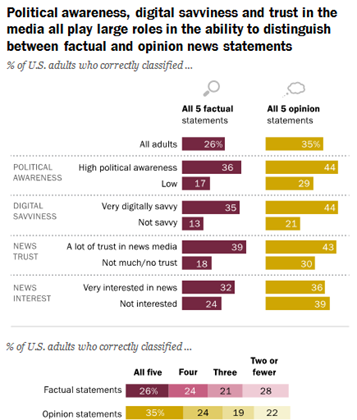In today’s fast-paced and complex information environment, news consumers must make rapid-fire judgments about how to internalize news-related statements – statements that often come in snippets and through pathways that provide little context.
A new Pew Research Center survey of 5,035 U.S. adults examines a basic step in that process: whether members of the public can recognize news as factual – something that’s capable of being proved or disproved by objective evidence – or as an opinion that reflects the beliefs and values of whoever expressed it.
The findings from the survey reveal that even this basic task presents a challenge. The main portion of the study, which measured the public’s ability to distinguish between five factual statements and five opinion statements, found that a majority of Americans correctly identified at least three of the five statements in each set. But this result is only a little better than random guesses. Far fewer Americans got all five correct, and roughly a quarter got most or all wrong.
Certain Americans do far better at parsing through this content than others. Those with high political awareness, those who are very digitally savvy and those who place high levels of trust in the news media are better able than others to accurately identify news-related statements as factual or opinion.
Trust in those who do the reporting also matters in how that statement is interpreted. Almost four-in-ten Americans who have a lot of trust in the information from national news organizations (39%) correctly identified all five factual statements, compared with 18% of those who have not much or no trust. However, one other trait related to news habits – the public’s level of interest in news – does not show much difference.
Both Republicans and Democrats are more likely to think news statements are factual when they appeal to their side – even if they are opinions.

Can you tell the difference between factual and opinion news statements? Follow this link to take the quiz.
Source: Mitchell, A., Gottfried, J., Barthel, M., & Sumida, N. (2018, June 18). Distinguishing Between Factual and Opinion Statements in the News. Pew Research Center.
